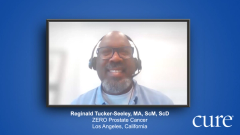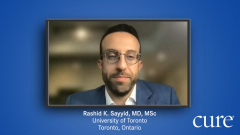
Differences in the Treatment of Patients with Prostate Cancer
An experienced public health and cancer researcher offers advice to patients newly diagnosed with prostate cancer and discusses barriers to access to care.
Episodes in this series

This is a synopsis of an Educated Patient Sound Bites series featuring Alicia Morgans, MD, MPH, of Dana-Farber Cancer Institute; Rashid K. Sayyid, MD, MSc, of the University of Toronto; and Reginald Tucker-Seeley, MA, ScM, ScD, of ZERO Prostate Cancer.
Dr Reginald Tucker-Seeley strongly recommends getting second opinions and engaging in shared decision-making to find the right physician fit. He advises replacing doctors unwilling to actively involve patients in treatment discussions. Resources at ZERO Prostate Cancer's website, ZEROcancer.org, provide patient programming and questions to ask during appointments.
On health disparities, Dr Tucker-Seeley states neighborhoods with more ethnic minorities and lower socioeconomics have fewer health-promoting resources, forcing residents to seek care elsewhere. This drives differences in outcomes by place. For example, African American men’s greater prostate cancer diagnosis and mortality rates vary further by geography. Location and accessible resources significantly impact health.
In total, Dr Reginald Tucker-Seeley covers the importance of second opinions, patient engagement/resources in prostate cancer care, and geographic/socioeconomic health disparities influencing outcomes.
*Video synopsis is AI-generated and reviewed by CURE editorial staff.







